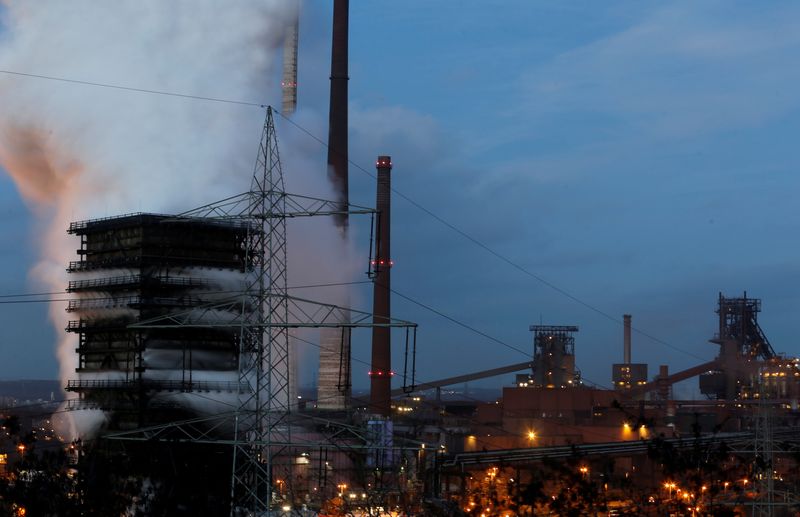By Susanna Twidale and Kate Abnett
LONDON/BRUSSELS (Reuters) - The price of carbon emissions permits in Europe's carbon market, the world's most established, hit a record high of 100 euros ($107) per tonne on Tuesday.
Here's what you need to know about the European Union's emissions trading system (ETS) and sectors affected by rising costs in the scheme:
WHAT IS AN EMISSIONS TRADING SYSTEM?
An ETS sets a cap on the amount of CO2 emissions that a sector, or group of sectors, can produce. The cap decreases each year, to ensure emissions fall over time.
The system creates CO2 permits, called EU Allowances (EUAs) for those emissions, which companies must buy for each tonne of CO2 they emit.
WHO IS COVERED?
The EU's ETS, launched in 2005, covers about 40% of all EU emissions, forcing more than 10,000 manufacturers, power plants and airlines flying within Europe to submit EU carbon permits each year for their emissions.
The system is the EU's core policy for reducing greenhouse gas emissions to meet its climate change targets. The EU has committed to cut net emissions by 55% by 2030 from 1990 levels.
WILL OTHER SECTORS BE INCLUDED?
The EU has agreed to add shipping to the EU ETS by 2026 and launch a separate ETS in 2027 covering emissions from fuels used in road transport and to heat buildings.
DO THEY ALL PAY THE SAME?
CO2 permits are traded on the open market, meaning companies, traders and investors buying them pay the same price.
Higher carbon costs mean industries either have to pass on the cost to customers like the power sector does, or absorb it themselves, hitting their margins.
However, while power sector companies are required to buy all the permits they need to cover their emissions, the EU gives many manufacturing industries free permits each year, reducing the costs they pay to comply. This is called free allocation.
About 57% of carbon permits in the EU ETS are sold, with the rest given to companies for free.
Free permits are given to sectors deemed vulnerable to "carbon leakage", the risk that high carbon costs would prompt them to relocate abroad to regions without carbon costs. Critics say by making it cheaper to pollute, free permits have reduced the incentive for industries to reduce their emissions.
More than 40 sectors are deemed to be at risk of carbon leakage and thus receive free permits. They include oil refineries, steel works and producers of iron, aluminium, metals, cement, lime, glass, ceramics, pulp, paper, fertilisers and organic chemicals.
HOW DOES FREE ALLOCATION WORK?
In the early years of the EU ETS, many sectors received all the permits they needed for free. Emissions from the EU power sector, which is required to buy all its CO2 permits, have fallen far faster than industry in recent years.
Each industry is given a benchmark reflecting emissions from the 10% best-performing installations in that sector. The benchmarks decrease slightly each year.
Installations that meet the benchmark are given all the permits they need. More polluting installations are not - providing an incentive to invest in less polluting factories.
As the EU strives to meet climate targets, it has curbed the amount of free permits industry receives. The system was designed to give industry 80% of its permits in 2013, falling to 30% in 2020.
The rules are set to get tougher this decade, as the EU has agreed to phase out free allocation for industry by 2034.
Airlines receive more than 80% of their permits for free, but the EU has agreed to make carriers pay for all of their permits by 2026.
WHAT ABOUT IMPORTS?
As the EU phases out European manufacturers' free CO2 permits, it will phase in a world-first carbon border tariff designed to prevent domestic firms from being undercut by overseas competitors.
The scheme will impose a levy on imports of carbon-intensive steel, aluminium, cement, fertilisers and electricity, phased in gradually from 2026 until it covers all such imports in 2034.
The cost paid by firms exporting those goods to Europe would be linked to the price of permits in the EU carbon market - aiming to put EU and overseas companies on a level footing.

Overseas firms will be required to buy a digital certificate for each tonne of CO2 emissions embedded in the goods they export to the EU. Companies that already pay CO2 costs in the country where the goods were produced can be exempted from the EU levy.
($1 = 0.9384 euros)